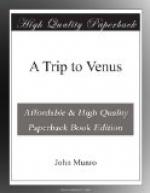“It has changed again: make another note.”
“What is it now?”
“Sodium. The yellow bands are unmistakable.”
A deep stillness reigned as before.
“There she goes again,” exclaimed the professor, much excited. “Now I can see a couple of blue lines. What can that be? I believe it’s indium.”
Another long pause ensued.
“Now they are gone,” ejaculated Gazen once more. “A red and a yellow line have taken their place. That should be lithium. Hey, presto!—and all was dark.”
“What’s the matter?”
“It’s all over.” With these words he removed the spectroscope from the telescope, and gazed anxiously at the planet “The light is gone,” he continued, after a minute. “Perhaps another cloud is passing over it. Well, we must wait. In the meantime let us consider the situation. It seems to me that we have every reason to be satisfied with our night’s work. What do you think?”
There was a glow of triumph on his countenance as he came and stood before me.
“I believe it’s a signal,” said I, with an air of conviction.
“But how?”
“Why should it change so regularly? I’ve timed each spectrum, and found it to last about five minutes before another took its place.”
The professor remained thoughtful and silent.
“Is it not by the light which comes from them that we have gained all our knowledge of the constitution of the heavenly bodies?” I continued. “A ray from the remotest star brings in its heart a secret message to him who can read it. Now, the Martians would naturally resort to the same medium of communication as the most obvious, simple, and practicable. By producing a powerful light they might hope to attract our attention, and by imbuing it with characteristic spectra, easily recognised and changed at intervals, they would distinguish the light from every other, and show us that it must have had an intelligent origin.”
“What then?”
“We should know that the Martians had a civilisation at least as high as our own. To my mind, that would be a great discovery—the greatest since the world began.”
“But of little use to either party.”
“As for that, a good many of our discoveries, especially in astronomy, are not of much use. Suppose you find out the chemical composition of the nebulae you are studying, will that lower the price of bread? No; but it will interest and enlighten us. If the Martians can tell us what Mars is made of, and we can return the compliment as regards the earth, that will be a service.”
“But the correspondence must then cease, as the editors say.”
“I’m not so sure of that.”
“My dear fellow! How on earth are we to understand what the Martians say, and how on Mars are they to understand what we say? We have no common code.”
“True; but the chemical bodies have certain well-defined properties, have they not?”




